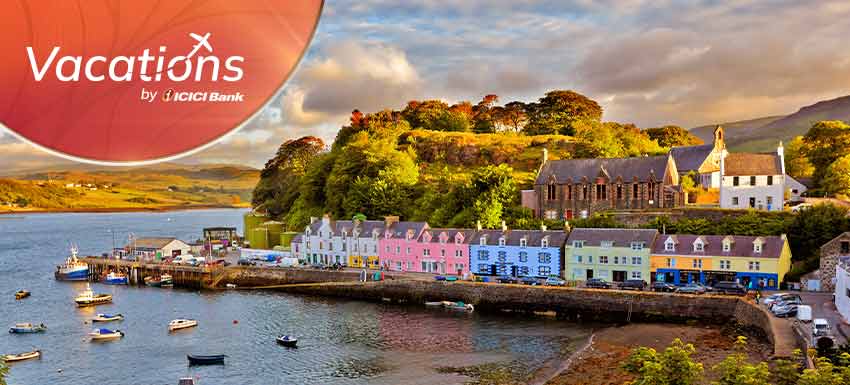THE
ORANGE
HUB
SCOTLAND Newsletter

ICICI Bank introduces VACATIONS – your monthly travel newsletter!
Month’s theme Introduction: Discover Scotland's Royal Past
Scotland – the name evokes both mystery and beauty. Is Scotland a country? It has a separate football team than England. It has its own parliament, its own currency, its own flag and of course its own unique culture. On the other hand, is Scotland a region within Great Britain? In the Olympics, Scottish athletes participate as part of the GB team and a UK Visa allows people to visit Scotland as well. So, which one is true? The answer is both!
Since 1922, the United Kingdom comprises four constituent countries: England, Scotland, and Wales (which collectively make up Great Britain), as well as Northern Ireland. While they are not independent countries, within the country of United Kingdom they operate independently on most matters. Even during Brexit, Scotland majority wanted to remain within EU, while England wanted the exit.
You might think these nuances are not important to a traveller, but in reality, knowing these details help us understand the ethos of a place better. We get a glimpse of what matters to the local population and what are the small details to keep in mind while travelling. For example, some businesses / people in England might not accept the pound note of the Bank of Scotland. In addition, the fact that Scottish people do not like to be called English. These might be little quirks for us but for people there, these are big issues affecting their demeanour and attitude towards many things.
Soul Trip: Let your travel teach you new things

There might be a lot of information available about every place in the world today, but we cannot know everything just by reading about it.
Guidebooks, the internet and other sources of information can certainly provide a wealth of knowledge about a place, but there is no substitute for actually traveling there and experiencing it first-hand.
For example, a guidebook can tell us about the history and architecture of a city, but only by wandering its streets and alleys can we truly appreciate its beauty and charm. Only when we see the local population walking in those streets, do we get a full sense of its history and heritage. By talking to locals, we can learn about hidden gems and off-the-beaten-path destinations that are not covered in most guidebooks.
Local governance, local politics is another thing that we never pay any attention to while we are trying to navigate our own lives at home. Yet, there are some commonalities and some unique nuances, which can only be understood when you are there. These experiences give us a deeper understanding and appreciation of a place's history and helps us connect with it better.
By immersing ourselves in a place's culture, interacting with its people and exploring its unique features and characteristics, we can truly know its finer nuances and gain a deeper appreciation for its complexity and diversity, which enhances our travel experience.
Discover Your World

Scotland: A land of never-ending beauty and mystery
On May 06, 2023, King Charles’ coronation ceremony will take place at Westminster Abbey in London and he will become the King of United Kingdom i.e. England, Scotland, Wales, Northern Ireland and the Commonwealth Realms. Scotland plays an important role in the coronation of the monarch – the Stone of Destiny from Scotland has been used during the King’s coronation since the 9th century.
While Scotland boasts of a rich history and culture, what really sets it apart is its stunning natural beauty. The landscapes of Scotland are truly breath taking, from the rugged peaks of the Highlands to the pristine beaches of the Hebrides. One of the most unique and stunning landscapes in Scotland is the Isle of Skye, which is located on the west coast of the country. With its dramatic rock formations, turquoise waters and rolling hills, Skye is a paradise for hikers, photographers and anyone who loves the great outdoors.
Another unique experience that you can only have in Scotland is exploring its many islands. The country has over 790 islands, each with its unique culture and landscape. One of the most famous of these islands is the Isle of Mull, which is home to a stunning array of wildlife, including otters, eagles and puffins. Visitors can also explore the island's quaint villages and historic castles, or take a boat trip to the nearby Isle of Staffa to see the famous Fingal's Cave.
A famous figure from Scottish folklore is the Kelpie, a shape-shifting water spirit said to inhabit Scottish lochs and rivers. You can learn more about Scottish folklore by visiting the National Museum of Scotland in Edinburgh or taking a guided tour with a local storyteller. Then of course, there is the ever-mysterious Loch Ness, a deep and foggy lake that is said to be home to the legendary Loch Ness Monster. Whether or not you believe in the monster, there's no denying the sheer beauty of the surrounding countryside, which is dotted with charming villages and historic castles.
Speaking of castles, Scotland is home to some of the most impressive fortifications in Europe. One of the most famous is Edinburgh Castle, which sits atop a rocky hill in the heart of the Scottish capital. From its walls, you can enjoy sweeping views of the city below and learn about the castle's rich history, which dates back to the 12th century. Other notable castles include Stirling Castle, which played a key role in Scotland's wars of independence and the Eilean Donan Castle, which is situated on a small island in Loch Duich and is one of the most photographed castles in the country.
Beyond its natural beauty and historic castles, Scotland is also known for its vibrant culture. The country has a rich artistic heritage, with famous Scottish writers such as Robert Burns, Sir Walter Scott and world-renowned painters like the Glasgow Boys. The Scottish people are also known for their love of music and dance, with traditional styles like the Ceilidh, which is still popular today. Ceilidhs are often held in community halls and feature live music, dancing and plenty of opportunities to socialise with the locals. Another unique cultural experience in Scotland is attending a Highland Games, which are athletic competitions that showcase Scottish traditions like caber tossing and hammer throwing.
Of course, no discussion of Scotland's culture would be complete without mentioning its national dress, the kilt. This distinctive garment, which is made from tartan cloth and worn by men and women alike, has become an enduring symbol of Scottish identity. The kilt is often worn to formal events like weddings and Ceilidhs and is sometimes paired with a traditional jacket and sporran, a small pouch worn around the waist.
Food is another important aspect of Scottish culture, and the country is known for its hearty and flavorful cuisine. One of the most famous Scottish dishes is haggis, a savory pudding made from sheep's offal, onions and oats. While it might not sound particularly appetising, Haggis is actually quite delicious when prepared properly. Other popular dishes include the Cullen skink, a creamy soup made from smoked haddock, and stovies, a hearty stew made with potatoes and meat.
Scotland is a country that is steeped in history, with a wealth of fascinating stories to discover. From the ancient stone circles of Orkney to the bloody battlefields of Bannockburn and Culloden, Scotland has a rich and complex history that is just waiting to be explored. Visitors can learn about the country's history at museums and galleries throughout Scotland, including the National Museum of Scotland in Edinburgh and the Kelvingrove Art Gallery and Museum in Glasgow.
Travel Smart

Best things to eat and drink during travel
Traveling can be exciting, but it can also be taxing on your body. One of the challenges that travellers face is maintaining a healthy diet while on the go. However, with a little bit of planning and preparation, it is possible to eat healthy, feel good, alert and energetic during your travels.
Maintaining a healthy diet during travel can help you feel better and more energised. Here are some tips on what to eat and drink during your travels.
Stay hydrated: Dehydration can cause fatigue, headaches and constipation. Drink plenty of water before, during and after your flight or journey. Avoid alcohol, caffeinated drinks and sugary beverages, as these can dehydrate you
Pack snacks: Packing your own snacks can save you money and ensure that you have healthy options on hand. Some good snack options include nuts, fruit, protein bars and trail mix. Avoid junk food and processed snacks, as they can make you feel sluggish
Choose foods that are easy to digest: When you are traveling, your digestive system may be more sensitive than usual. Choose foods that are easy to digest, such as steamed vegetables, grilled chicken and brown rice
Avoid foods that cause bloating: Some foods can cause bloating and discomfort, such as beans, broccoli and carbonated drinks. Avoid these foods before and during your flight or journey
Bring herbal tea: Herbal tea is a great way to stay hydrated and calm your nerves during travel. Some good options include chamomile, ginger and peppermint tea.
By planning ahead and being mindful of what you eat and drink, you can travel better and arrive at your destination feeling refreshed and energised.
Sustainable Travel Tip of the Month

“To get a sample itinerary for Scotland, "Click here”
Let’s all be responsible travellers
A responsible traveller is a traveller with awareness.
Being a traveller with awareness is about having a genuine interest in the places we visit. It is about taking the time to learn about the local culture, history and current affairs. By doing so, we imbibe a more wholesome and deep travel experience, while showing respect and appreciation for the places we visit.
Travelling has become much easier and more accessible than ever before. That is why some of us take our vacations for granted. However, with this convenience comes responsibility. A responsible traveller is traveller with awareness who takes the time to learn about the places they visit. By understanding the history, geography and current affairs of a place, we can have a more meaningful and informed travel experience.
When we travel, we are guests in another culture. As such, it is important to be respectful and mindful of the local customs and traditions. By learning about the history and geography of a place, travellers can gain a deeper understanding of the local culture and traditions. This knowledge can also help travellers avoid inadvertently offending locals with their behaviour or dress.
In addition, by reading more about a place and keeping up to date with the current affairs of a place, travellers can be more aware of any potential dangers or risks. This can include weather conditions, political unrest, environmental issues or health concerns. Moreover, by staying informed, travellers can make informed decisions and be more protective of the local environment and culture.
‘Vacations’ is powered by OneShoe Trust for Responsible & Mindful Travels – a travel event and marketing social enterprise that promotes travelling as a means to raise awareness about climate change and preserving local ecology.
Incubated at IIM Bangalore, OneShoe is the source of the most authentic travel experiences around the world.
oneshoetravels.com
Scroll to top














